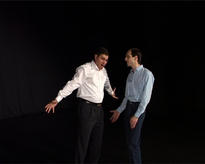MEKHITAR GARABEDIAN - LEARNING PIECE: BE PATIENT, MY SOUL
BLACK BOX - SCREENING
This ‘learning piece’, like American artist Vito Acconci’s 1970 Learning Piece, concerns a performance in which a song is learned measure by measure, bit by bit. But, as Garabedian states in an interview, his is an appropriation of Acconci’s performance. During his own performance, Acconci sits at a table, playing a tape of Leadbelly’s Black Betty. He repeats the first two phrases and sings along with them. Adding two phrases at a time, he learns the entire song. It takes him two hours to get it right.
Whereas for Acconci, the subject-as-body, the contemporary practice of bodily ‘training exercises’ and ‘learning sessions’ (including the idea of ‘daily improvement’) are important factors, Garabedian’s remake, which lasts just under 16 minutes, is of a different order. Rather than the artist appearing alone, there are two performers: an older Armenian man and the artist himself. The former teaches the latter an old Armenian revolutionary song. The older man not only teaches the song’s verses, but tries passionately to express and transmit its romantic revolutionary and patriotic spirit: “Our question will soon be resolved./Be patient, my soul, be patient.” The lyrics’ romanticism and patriotism are heavily influenced by lack (of a home country) and by loss: that of the two million Armenians who died during the Turkish genocide. The piece is as much about the ethics of remembering as it is about the political imperative to unite.
By identifying with the song’s content, the two performers physically allude to an altogether different ‘body’ from the subject-as-body which Acconci seems to be wrestling with: the political body (and body politic) of self-proclaimed revolutionary patriotism. Besides their contrasting ages, there is an important difference between the two men, and it has to do with ‘memory anxiety.’
The old man seems very eager to teach the young man his (and his people’s) song. Garabedian, the pupil, is keen to learn the song, but by definition – as a third-generation Armenian living as an exiled artist in Belgium – his is a doubly distant position. Distant in time and space -- Garabedian was born in Syria in the 1970s and came to Belgium with his parents--and distanced by medium: the (representation of an) enactment of learning a revolutionary song is far different than learning a revolutionary song tout court.
In this way, Learning Piece’s second life, while embedded in Armenian culture and history, is a recording of the disappearance of a culture and a language through exile:
“Exile reduces the old body, the old language, to a corpse.” (Mekhitar Garabedian)
Whereas for Acconci, the subject-as-body, the contemporary practice of bodily ‘training exercises’ and ‘learning sessions’ (including the idea of ‘daily improvement’) are important factors, Garabedian’s remake, which lasts just under 16 minutes, is of a different order. Rather than the artist appearing alone, there are two performers: an older Armenian man and the artist himself. The former teaches the latter an old Armenian revolutionary song. The older man not only teaches the song’s verses, but tries passionately to express and transmit its romantic revolutionary and patriotic spirit: “Our question will soon be resolved./Be patient, my soul, be patient.” The lyrics’ romanticism and patriotism are heavily influenced by lack (of a home country) and by loss: that of the two million Armenians who died during the Turkish genocide. The piece is as much about the ethics of remembering as it is about the political imperative to unite.
By identifying with the song’s content, the two performers physically allude to an altogether different ‘body’ from the subject-as-body which Acconci seems to be wrestling with: the political body (and body politic) of self-proclaimed revolutionary patriotism. Besides their contrasting ages, there is an important difference between the two men, and it has to do with ‘memory anxiety.’
The old man seems very eager to teach the young man his (and his people’s) song. Garabedian, the pupil, is keen to learn the song, but by definition – as a third-generation Armenian living as an exiled artist in Belgium – his is a doubly distant position. Distant in time and space -- Garabedian was born in Syria in the 1970s and came to Belgium with his parents--and distanced by medium: the (representation of an) enactment of learning a revolutionary song is far different than learning a revolutionary song tout court.
In this way, Learning Piece’s second life, while embedded in Armenian culture and history, is a recording of the disappearance of a culture and a language through exile:
“Exile reduces the old body, the old language, to a corpse.” (Mekhitar Garabedian)
Related events

-
Tue 31.3.2009
- Sat 11.4.2009
-
Practical info
Location:
argos
Entrance fee:
included in the general argos exhibition entrance fee - Artists
- Works